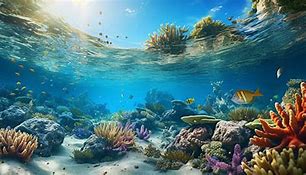Introduction to Ocean Depths
Underwater:3u1qizs_9ra= ocean, covering over 70% of Earth’s surface, is one of the most vast and enigmatic environments on our planet. Its depths are home to an incredible array of marine life, geological formations, and ecological systems. This article delves into the mysteries of the ocean, exploring its importance, the diversity of life it supports, and the ongoing efforts to understand and protect this vital resource.
The Ocean’s Complex Ecosystems Underwater:3u1qizs_9ra= ocean
The ocean is not a homogeneous entity but a complex mosaic of diverse ecosystems, each with its unique characteristics and life forms.
Coral Reefs
Underwater:3u1qizs_9ra= ocean Coral reefs, often referred to as the “rainforests of the sea,” are some of the most vibrant and diverse ecosystems in the ocean. Found primarily in warm, shallow waters, coral reefs are home to thousands of species of fish, invertebrates, and algae. They provide essential services such as coastal protection, support for fisheries, and tourism opportunities. However, coral reefs are increasingly threatened by climate change, pollution, and overfishing, making their conservation a critical concern. Underwater:3u1qizs_9ra= ocean
Deep-Sea Environments
Underwater:3u1qizs_9ra= ocean In contrast to the colorful coral reefs, the deep-sea environment is characterized by darkness, cold temperatures, and high pressure. The deep-sea is home to some of the most mysterious and unique creatures on Earth, such as the giant squid and bioluminescent fish. These organisms have adapted to extreme conditions, showcasing the incredible resilience and adaptability of marine life. Research into deep-sea ecosystems is still in its infancy, with many species and ecological processes remaining undiscovered. Underwater:3u1qizs_9ra= ocean
The Ocean’s Role in Climate Regulation
The ocean plays a crucial role in regulating the Earth’s climate and supporting life on our planet.
Carbon Sequestration
The ocean is a major carbon sink, absorbing a significant portion of the carbon dioxide (CO2) emitted by human activities. Phytoplankton, tiny marine plants, absorb CO2 during photosynthesis, and when they die, this carbon can be stored in the ocean for long periods. The ocean’s ability to sequester carbon helps mitigate the effects of climate change, although increased CO2 levels also lead to ocean acidification, which poses a threat to marine ecosystems.
Heat Distribution
The ocean acts as a global heat conveyor, distributing heat around the planet through ocean currents. These currents, such as the Gulf Stream and the Antarctic Circumpolar Current, play a vital role in regulating regional climates and weather patterns. Changes in ocean currents can have significant impacts on weather systems, sea levels, and marine ecosystems.
Marine Biodiversity: A Rich Tapestry of Life
The ocean is home to an astonishing diversity of life, with estimates suggesting that up to 80% of marine species remain undiscovered.
Marine Flora and Fauna
Underwater:3u1qizs_9ra= ocean From the smallest microorganisms to the largest whales, the ocean supports a wide range of life forms. Marine flora, including seaweeds and seagrasses, provide essential habitat and food sources for many marine animals. Marine fauna, including fish, mammals, reptiles, and invertebrates, exhibit a remarkable range of adaptations and behaviors. The study of marine biodiversity helps scientists understand the complexities of ocean ecosystems and the interconnectedness of life. Underwater:3u1qizs_9ra= ocean
Endangered Species
Underwater:3u1qizs_9ra= ocean Many marine species are currently endangered or threatened due to human activities such as overfishing, habitat destruction, and pollution. Iconic species such as sea turtles, sharks, and certain species of whales are at risk, with their populations declining at alarming rates. Conservation efforts are essential to protect these species and ensure the health and resilience of marine ecosystems. Underwater:3u1qizs_9ra= ocean
Human Impact on the Ocean
Human activities have a profound impact on the ocean, affecting its health, biodiversity, and functionality. Underwater:3u1qizs_9ra= ocean
Pollution
Ocean pollution, including plastic debris, oil spills, and chemical runoff, poses a significant threat to marine life. Plastics can entangle marine animals, be ingested, and cause physical harm or toxic effects. Oil spills can devastate ecosystems, coating marine animals and disrupting food chains. Chemical pollutants, such as pesticides and heavy metals, can accumulate in the ocean and harm both marine life and human health. Underwater:3u1qizs_9ra= ocean
Overfishing
Overfishing depletes fish stocks and disrupts marine ecosystems, leading to imbalances in food chains and the decline of species. The practice of unsustainable fishing, including bycatch and destructive fishing techniques, threatens the health of ocean habitats and the livelihoods of communities dependent on fishing. Implementing sustainable fishing practices and protecting marine reserves are critical steps in addressing overfishing and ensuring the long-term health of the ocean.
Exploration and Conservation Efforts
Understanding and protecting the ocean requires ongoing exploration, research, and conservation efforts.
Scientific Research
Scientific research plays a crucial role in exploring and understanding the ocean’s complexities. Advances in technology, such as remote-operated vehicles (ROVs), autonomous underwater vehicles (AUVs), and satellite monitoring, have expanded our ability to study deep-sea environments and monitor ocean conditions. Research institutions and marine biologists work to uncover new species, understand ecological processes, and assess the impacts of human activities on marine ecosystems.
Marine Protected Areas
Marine protected areas (MPAs) are designated regions of the ocean where human activities are restricted or regulated to protect and conserve marine life and habitats. MPAs help safeguard biodiversity, support fish populations, and allow ecosystems to recover from human impacts. Expanding and effectively managing MPAs are essential for preserving marine ecosystems and ensuring the sustainability of ocean resources.
The Future of the Ocean
The future of the ocean depends on our collective efforts to address environmental challenges and promote sustainable practices.
Climate Change Adaptation
Adapting to the impacts of climate change is crucial for the health of the ocean and its ecosystems. Strategies include reducing greenhouse gas emissions, protecting and restoring marine habitats, and enhancing resilience to climate-related stressors. Collaboration between governments, scientists, and communities is essential to develop and implement effective adaptation measures.
Public Awareness and Education
Raising public awareness and educating people about the importance of the ocean is vital for fostering a culture of conservation and responsible stewardship. Educational programs, outreach initiatives, and citizen science projects can engage individuals in ocean conservation efforts and inspire positive change. Promoting ocean literacy and encouraging sustainable behaviors can help ensure a healthier and more resilient ocean for future generations.
Conclusion
The ocean is a remarkable and vital component of our planet, playing a crucial role in regulating climate, supporting biodiversity, and providing resources for human well-being. Its vast and diverse ecosystems, from vibrant coral reefs to mysterious deep-sea environments, showcase the incredible richness of marine life. However, the ocean faces significant challenges due to human impacts, including pollution, overfishing, and climate change. Through scientific research, conservation efforts, and public education, we can work towards a sustainable future for the ocean and ensure that its wonders continue to thrive for generations to come.


